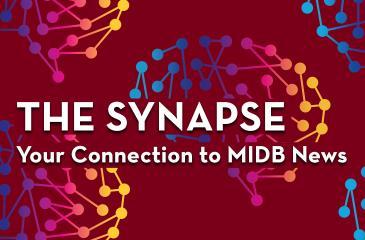The Synapse: Aug. 2023
Working Together to Advance Early Childhood Development
A fundamental principle of brain development is that “earlier is better” because the brain has critical periods of development in early life, which when missed, result in life-long neurobehavioral problems. MIDB's integration of clinical care with clinical research activities can offer patients expedited pathways to therapies. Here are a few early childhood development and mental health programs at MIDB:
- Baby's First Years is the first study in the United States to assess the impact of poverty reduction on family life and infant and toddlers’ cognitive, emotional, and brain development. The study will identify whether reducing poverty can affect early childhood development and the family processes that support children’s development. Mothers were recruited after giving birth at hospitals in four metropolitan areas: New York City, New Orleans, the Twin Cities, and Omaha. The MIDB housed the Twin Cities site, where the Age 4 data collection wave just wrapped up. More than 100 families participated in the Age 4 wave at the MIDB, and planning/piloting for subsequent waves is underway.
- The Birth to Three Clinic was founded based on leading-edge research in early brain development, including the role of toxic stress and the importance of family dynamics. The first three years are the most rapid period of development in a person’s life, and also when the brain is at its most flexible. The program is designed to bring research into the clinic as quickly as possible. The most up-to-date findings on brain development guide us as we put interventions and assessments together. The Birth to Three program also furthers scientific understanding by providing first hand insight back to researchers.
- The Institute on Community Integration’s Early Childhood area conducts widely-quoted research on autism spectrum disorder (ASD) prevalence, particularly in underserved communities. These programs provide in-depth training for parents, community leaders, and U of M students on the importance of early identification for individuals with ASD and on understanding developmental milestones. This program area also provides data on transition, community living, and employment outcomes for individuals with ASD.
MIDB is proud to be a home to bright minds from diverse disciplines who come together to accelerate discovery and help young brains flourish, now and throughout life.

Disabilities Research Project Grant Applications Now Open
MIDB is pleased to announce a funding opportunity for research in intellectual and developmental disabilities. The primary objective of this funding competition is to identify a research proposal to be included as the signature project as part of an NICHD P50 application for a highly competitive Intellectual and Developmental Disability Research Center to be submitted Spring 2024. We anticipate three or four awards will be made in two phases. Two to three awardees from the first phase of competition will receive $25K of funding each. Learn more.

NIH Grant Supporting Research That Could Result In A Quantifiable Way To Diagnose Tourette Syndrome
MIDB researcher Christine Conelea, PhD, and her research team are using a five-year National Institutes of Health R01 grant, “Quantification of Tics in Tourette’s Syndrome,” to develop video-based tools that measure tics. “We’re building off the idea that in most neuropsychiatric conditions, we don’t have good ways to objectively measure symptoms and their severity,” said Conelea. “We rely on patient interviews and on patient-completed questionnaires that may not best capture how severe symptoms are, especially with movement disorders where people are not always fully aware of all their symptoms.” Read more about the study.
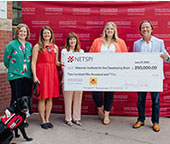
MIDB Great Community Get-Together
Approximately 165 guests attended the MIDB Great Community Get-Together in June. In addition to enjoying food and refreshments, attendees met Jersey, the MIDB’s new facility dog, as well as enjoyed a range of activities including face painting, a photo booth, sensory play, a community art project, giveaways, and more. Amy Esler, MIDB's co-director of clinical services, provided welcome remarks and thanked NetSPI for its support of Child Family Life Service programs and Jersey. At the event, NetSPI presented a $250,000 gift supporting a very special role for Jersey, who is highly trained to help children and families during office visits. Thanks to NetSPI and everyone who attended the event.
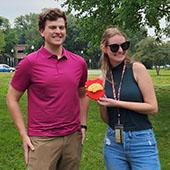
MIDB Summer Series
Thanks to everyone who attended the inaugural MIDB Summer Series. Approximately 80 people were at each event, which included lunch, a short presentation from an MIDB occupant, discussion of building issues, and then a cornhole match.
Presenters included:
- Alana Lieske: Non-invasive Neuromodulation Laboratory
- Diane Jorgensen, Mackenna Sullivan, Saniya Truex: MIDB Clinic social work care coordination team
- Allison Hudson: MIDB Clinic overview
- Kristin Dean: ICI accessible publication systems
- Cala Heffernan: MIDB Child Family Life program
- Nik Fernholz: ICI Art for All
Twenty-four teams competed in the cornhole tournament. Tournament champions were Nick Barth and Natalie Kern from the DCAN lab, and runners up were Tim Hendrickson and Erik Lee from the Informatics Hub.

Clinical Spotlight: Early Childhood Mental Health Program
The Early Childhood Mental Health (ECMH) program provides primarily therapeutic services, which typically involve a significant component of parent coaching/guidance. The ECMH program begins with a diagnostic evaluation (aka an intake) which is separated across two sessions: First is a parent/caregiver session to gather background information, the second is a parent/caregiver-child observation session. At the end of these two sessions, the family is provided with feedback and a full report, including our recommendations. Learn more about the ECMH program.
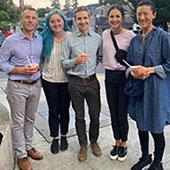
MIDB Members Present at the Research Society on Alcohol Meeting
Members of the Fetal Alcohol Spectrum Disorders Research Lab presented at the 46th Annual Research Society on Alcohol Scientific Meeting in Bellevue, Wash., in June. The meeting provides a forum for alcohol researchers – from all disciplines – to present their latest findings and to learn about new research developments in an environment that provides interaction at both the professional and personal level. Presenters included Jeffrey Wozniak, PhD: "Short and long-term outcomes following nutritional intervention in Fetal Alcohol Spectrum Disorders;" and Blake Gimbel, PhD: "Atypical neurodevelopmental trajectories following prenatal alcohol exposure: Further evident from cortical, subcortical, and white matter diffusion MRI paradigms" and "Brain MRI in the diagnosis of FASD: Leveraging big data to improve diagnostic sensitivity". Learn more about the presentations.

Meet MIDB Researcher Sheryl Larson
Sheryl Larson, PhD, FAAIDD, FIASSID, research manager at the Institute on Community Integration (ICI), directs research, evaluation, and technical assistance projects involving secondary analysis of large data sets, survey research, intervention research, research synthesis, and policy studies. She is also a mentor and lecturer in the MNLEND program and Interdisciplinary Disability Certificate program. "I love working at MIDB," she said. "Besides being a dramatic improvement in the physical location and safety of my workspace, working at MIDB has opened up new opportunities for continuing education and collaboration with people working on fascinating research and intervention projects from other parts of the University. Pairing the ICI which focuses on applied and policy research and intervention with the science of brain research increases opportunities to learn about relevant research directly rather than just from journal articles. I also love that we are now colocated with the Autism Clinic. At ICI we develop many resources that are directly relevant to families and individuals with ASD. Being located in the same building increases the likelihood that those resources can get to people who need them."
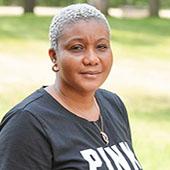
“Let’s Try a Different Way”
Wrapping up her fellowship this spring with the Minnesota Leadership in Neurodevelopmental and Related Disabilities (MNLEND) program, Agnes Cole was also juggling an administrative role at an area service provider and running her own non-profit organization dedicated to supporting people with disabilities to access services. Cole (MNLEND 2022-23) is founder and executive director, along with her husband, Prince, of the Disability Motivational Network, a nonprofit organization offering support groups and other services to people with disabilities. Both Agnes and Prince were born in West Liberia, Africa, with physical disabilities, and their disability experiences created a passion to help others with disabilities overcome challenges. Many of the people who come to the organization for support have immigrated to the United States, and they often aren’t aware of important disability services available in their communities, she said. Learn more about Cole.

MIDB Artwork Spotlight: Original Ceramic Pieces
Ceramic artist Donna Ray's experience with art started with playdough. "As a child I enjoyed making structures out of the colorful, salted clay for orientational purposes," she says. "My father would draw for me when I was young, when he was still alive. He drew people, small animals and birds. Then he would give me playdough to build everything he drew." Today, three of Ray's pieces are now part of MIDB's art collection. Learn more about Donna Ray and her art at MIDB.

my life Art Exhibition through Sept. 29 at MIDB
ICI's new Art for All exhibit presents a window into the daily lives and future dreams of youth with disabilities who are transitioning to adulthood. The exhibition is displayed in the Blythe Brenden-Mann Community Center. Learn more about the exhibit.
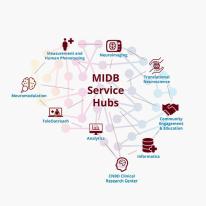
Research Service Hub Updates
- Lin Zhang, PhD, is filling in for Mark Fiecas, PhD, as interim co-leader for MIDB's Analytics Hub while he is on sabbatical.
- Angie P. Mejia, PhD, has joined the Community Engagement and Education (CEEd) Hub as its new assistant director.
